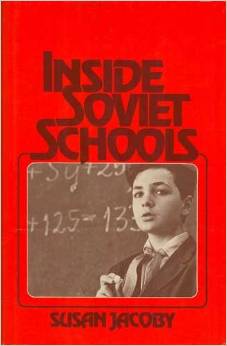 Perhaps because I was a high school teacher, the Soviet school system fascinated me. I enjoyed listening to Alla and Vera tell tales of their lives in their English language schools. Once we captured their stories, it was time for more objective research.
Perhaps because I was a high school teacher, the Soviet school system fascinated me. I enjoyed listening to Alla and Vera tell tales of their lives in their English language schools. Once we captured their stories, it was time for more objective research.
Although I’m grateful for the ability to research from my computer at home, I still feel the need to check the stacks at the university library just in case there’s a treasure awaiting discovery. Indeed, within fifteen minutes of arriving at Wilson Library, I felt like shouting “eureka!” There sat Inside Soviet Schools by Susan Jacoby—a study she conducted while Vera and Alla were students in their Leningrad special schools.
The detail Jacoby provided such as the curriculum guide and daily schedule for kindergarten offered context for Vera and Alla’s memories. Schools, Jacoby writes, “prepare for the serious business of life.” (73) Jacoby, however, does not write in overly serious academic language. Her analogies to American Catholic schools and her many quotes from schoolchildren and teachers made reading Inside Soviet Schools a joyous business.
Although Jacoby’s book covers the Soviet educational system as a whole, she also delves into the issue of minorities and education providing statistics that demonstrate that there was a gap between rural and urban students, minority and Russian students. She cited the increased discrimination against Jews in the early 1970s writing:
“the highly visible educational achievement of Soviet Jews seems somewhat paradoxical in light of the continuing evidence of discrimination against Jews in many areas of Soviet life. The disproportionately high education level of Soviet Jews-which parallels the achievement of Jews in many other countries, including the United States-is one indication that the Soviets Union’s educational policy is limited to some degree by the cultural proclivities of its citizens. Although the Revolution opened an entire range of educational institutions which had been closed to Jews under the Tsars, there has been discrimination against Jews in higher education-sometimes mild, sometimes severe - since the early 1930s. The discrimination has always been most evident in the Ukraine...However, the figures speak for themselves. The Jewish desire for education was stronger than any discrimination. (Discrimination against Jews in higher education seems to be on the increase once again; the total number of Jews in higher educational institutions has dropped substantially since 1968).” (154-155)
For this blog, I did a little research on Susan Jacoby to find out how she had such good access to Soviet school officials, students, and teachers. I also wondered about her own background that equipped her to write such a well researched and accessible book.
Jacoby graduated from Michigan State in 1966, became a reporter for the Washington Post and by 1969 she was on her way to Moscow when her husband Anthony Astrachan became the Post’s Moscow correspondent. With her Russian language skills, Jacoby was poised to research daily life in Russia. Before publishing Inside Soviet Schools, she wrote more generally about life in the USSR in Moscow Conversations.
Susan Jacoby has continued her writing career in different directions. Her memoir, Half-Jew, traces her discovery of her own Jewish roots and the anti-Semitism her dad faced especially at Dartmouth in the 1930s. This may partially account for her heightened sensitivity to issues of anti-Semitism while in Moscow. Jacoby has continued to write throughout her life. Her current books reflect her interest in American intellectual history.
We wish you such good luck in your research forays at the library and may you also enjoy following a thread that leads to more and more discoveries.
Selected works of Susan Jacoby
Jacoby, Susan. Inside Soviet Schools. New York: Hill and Wang, 1974.
Jacoby, Susan. Half Jew. New York: Scribner, 2000.
Jacoby, Susan. Moscow Conversations. New York: Coward, McCann, and Geoghegan, 1972.